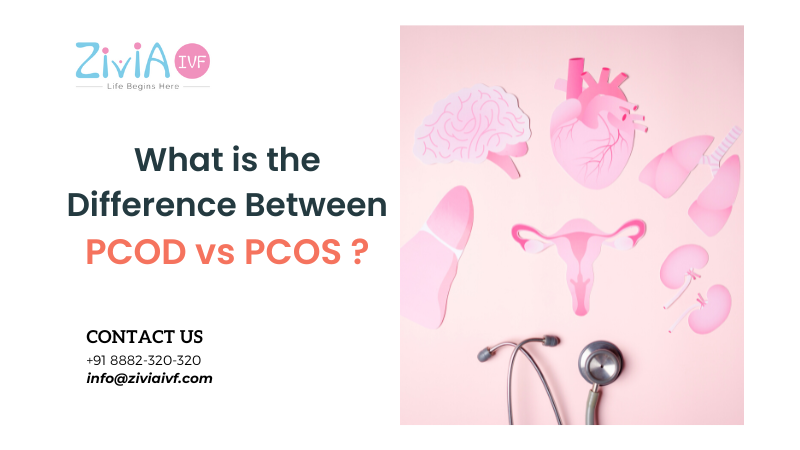Are PCOD and PCOS identical? Many women are unsure of the difference between PCOD and PCOS. As a result, they frequently use the terms interchangeably, especially when trying to understand how PCOS and PCOD are related, which is a frequent occurrence.

The truth is that they are very different, despite the similarities, such as the fact that both conditions are related to the ovaries and result in hormonal disruptions. So let’s now look at these two conditions to determine what sets them apart.
What is Polycystic Ovarian Disease?
As the ovaries generate and release an unusually high volume of immature eggs throughout the ovulation cycle, PCOD, also known as Polycystic Ovarian Disease, leads to irregular menstruation cycles. For months, more eggs are generated as a result of the trapped eggs inside the ovary. Cysts can develop in the ovary even if partially grown and stored eggs may appear to be safe. Cyst-like growths on the body also boost the production of androgen.
What is Polycystic Ovarian Syndrome?
PCOS, or Polycystic Ovarian Syndrome, is the most diagnosed medical condition. When the body’s hormones are out of balance, it happens. This is easily confused with PCOD because they both have vague definitions. The development of cysts in the ovaries does not always bring on the hormonal imbalance as in PCOS.
Women between the ages of 12 and 51 are most at risk for PCOS. Infertility and PCOS are strongly related, partly because PCOS makes ovulation abnormalities more frequent. In addition, new research indicates that PCOS is the root cause of women’s fertility issues, particularly in India.
How are PCOS and PCOD different?
PCOS is considered a major issue, as it is a metabolic disorder. PCOD, on the other hand, is not regarded as a real disease because it may be managed with the right diet and exercise.
A diagnosis of PCOS is made when you have at least 2 of the following symptoms:
- Irregular periods
- Too much androgen
- Polycystic Ovaries (PCO)
Let’s see the differentiation in PCOS and PCOD based on the following pointers:
Causative Aspects: PCOD is an endocrine system disorder, whereas Polycystic Ovary Syndrome is brought on by a hormonal imbalance. Both conditions are known to be significantly influenced by hereditary factors and aberrant hormone levels. High levels of male hormones, so the theory goes, prevent ovaries from producing eggs and hormones properly. Insulin resistance and inflammation are also linked to higher testosterone production.
Occurrence of the condition: In contrast to PCOS, PCOD is relatively more common. The polycystic ovarian disease affects up to one-third of women worldwide. However, the prevalence of polycystic ovary syndrome is lower.
How PCOD and PCOS affect pregnancy: Polycystic ovarian disease (PCOD) and PCOS must not be viewed as barriers to pregnancy as they do not always result in infertility in women. Women may be able to get pregnant easily and without any help in roughly 80% of situations. However, conception might be difficult for women with PCOS due to hormonal imbalances.
Here is when you should visit a doctor
For the prevention and management of diseases and hormone imbalances, it’s crucial to maintain good health. Early diagnosis and taking the required steps to treat the condition are the most effective ways to manage PCOD and PCOS. For example, if you have excessive bleeding, infertility, obesity, irregular periods, unusual weight gain, acne on the face or body, ovarian cysts, hirsutism, missed periods (amenorrhea), or pelvic pain, you must consult an expert.
Why choose Zivia IVF for expert consultation?
If you have any symptoms mentioned above and require expert consultation to manage the conditions, book an appointment with Zivia IVF today. With a team of skilled professionals backed with advanced equipment, Zivia IVF has helped several women with PCOS, PCOD, and infertility.
